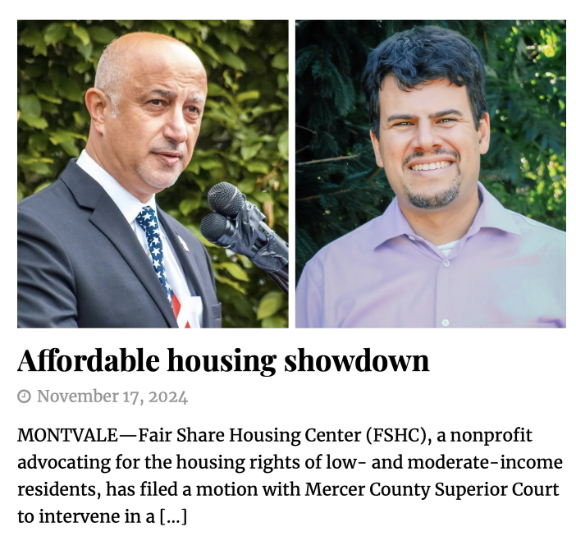
MONTVALE—The lead attorney for Montvale’s now 28-town lawsuit against the fourth round of New Jersey’s affordable housing mandates said that a show cause hearing on Dec. 20 in Mercer County Superior Court will determine whether the mandates are paused as their lawsuit makes its way through the courts.
Meanwhile, the Borough Council voted 5-0 on Nov. 14 to increase funding for its special affordable housing counsel to an amount not to exceed $100,000. The team, King Moench & Collins LLP, is representing Montvale and, at press time, 27 other towns in a lawsuit challenging the state’s latest affordable housing law and its fourth round of housing obligations.
‘Irreparable harm’
Attorney Mike Collins, of King, Moench & Collins LLP, told an affordable housing “town hall” meeting held Nov. 18 at Borough Hall — streamed live on Mayor Michael Ghassali’s Facebook page — that unless the Dec. 20 hearing puts a stay, or hold, on the state-imposed affordable deadlines, municipalities suing the state will be “irreparably harmed” if they have to determine an affordable housing obligation before the multi-town lawsuit is decided.
Collins said whether the court decides to stay the state-imposed affordable deadlines or not on Dec. 20, the lawsuit will continue. Led by Montvale’s mayor, the lawsuit’s towns have formed a coalition called Local Leaders For Responsible Planning.
Ghassali’s 90-minute town hall on Nov. 18 featured Collins and State Sen. Holly Schepisi (39th District) providing updates on affordable issues and answering questions from about 50 attendees. Schepisi called the affordable housing process “an incredibly broken system.”
Questions focused on why more towns were not joining the lawsuit, disparities in affordable housing obligations for suburban vs. urban aid communities, recent affordable obligation numbers to towns from the DCA, how affordable numbers were calculated, and how much affordable housing New Jersey’s towns can accommodate.
Collins noted that local officials face a Jan. 31, 2025 deadline to certify their local affordable housing obligation number to state DCA officials. Otherwise, he said, the towns would lose immunity from builder’s remedy lawsuits as well as local zoning powers, opening the door to possible unwanted, high-density development.
Lawsuit against Mount Laurel fourth round
Collins said the Montvale lawsuit filed Sept. 9 in Mercer County Superior Court addresses issues that affect the Mount Laurel Doctrine’s application now. He said urban aid towns were exempted from affordable obligations starting in the 1970s, which may have made sense then.
He said these towns were not growth areas, noting then that 102% of housing growth occurred in suburban areas and non-urban aid towns. However, he said by 2010 according to a study, 50% of housing growth occurs in urban aid towns and 50% in non urban aid towns.
He said the 62 “urban aid” towns currently have “no rational basis to continue this exception.” Schepisi also said that a “disproportionate amount of construction aid” goes to rehabilitate urban housing, but those rehabilitated housing units are not counted towards the statewide affordable housing obligation.
Collins said the urban housing being rehabilitated needs to be subtracted from the statewide affordable housing obligation, which would lessen the affordable obligation statewide, including suburban areas.
Schepisi read from a list that cited examples of high affordable housing obligations released on Oct. 18 by the state DCA. Both she and Ghassali noted that local officials will be hard-pressed to meet state affordable deadlines, with both urging more towns to join the lawsuit. Ghassali said he took offense at towns looking to benefit from the lawsuit but unwilling to contribute funding.
Ghassali reached out statewide over the summer to solicit towns to contribute $20,000 to $10,000 in 2024 and $10,000 in 2025 to join the lawsuit to oppose the fourth round of affordable housing obligations. The fourth round runs July 1, 2025 through June 30, 2035.
Additional concerns
Schepisi said she felt some towns did not want to be involved with the lawsuit due to the power of a “non-government entity,” or Fair Share Housing Center, that was heavily involved in the affordable process and had forced settlements upon towns. “Some municipalities are very skittish about being ganged up on,” she said.
Answering a question, she noted there were 70 towns in Bergen County, and she said there were a variety of reasons they were not joining the Montvale lawsuit. New Jersey has a total of 564 municipalities.
Some might include not wanting a negative article printed in the newspaper, possibly calling them out as racist, she said, noting “a lot of bullying over the past decade in this regard.” She praised Montvale’s mayor and his efforts to fight against affordable housing.
“Montvale is a microcosm of everything New Jersey should be,” said Schepisi. She said the town has fulfilled its affordable obligations, and “we’ve just been kicked in the head again.” Montvale recently received a fourth round affordable obligation of 348 units, second highest in Pascack Valley after Woodcliff Lake at 423 affordable units.
(See “Next decade to see 2,000 more affordable units here,” Michael Olohan, Oct. 25, 2024.)
Schepisi said it can take her 40 minutes to get to the parkway in the morning due to heavy traffic from current area developments. “Bergen County cannot absorb what it is being asked to absorb,” she said, asking more communities to join Ghassali’s lawsuit, “and not be so fearful.”
She said if mayors and public officials do not speak up, it might be hard to recognize Bergen County in a decade. Schepisi said often her conversations with friends turn into discussions of where they are moving to to get out of New Jersey.
She said state leaders “keep doubling down on the same wrong policies and it’s not working and we need to say, ‘enough is enough’,” she added.
Ghassali noted that mayors and councilmembers need to be involved in the affordable housing issue because local officials know their towns and what they need to protect and preserve. He noted brooks, roads, schools, and other important local characteristics that affect where housing can go and how much housing.
He said over three rounds of affordable mandates, Montvale has built 365 affordable units, from a total of 1,080 “inclusionary” units, and has added nearly 2,000 residents.
At one point, Ghassali said during third round negotiations he was offered a “30% discount” by Fair Share on Montvale’s affordable obligations if he signed off on the number.
“What has stuck with me then and still does to this day is a question: what is the real number?” said the mayor. He urged Fair Share Housing Center to work together with towns’ officials “to find common ground to address this challenge together” and stop spending their money on legal fees.
The Borough Council voted 5-0 on Nov. 14 to increase funding for its special affordable housing counsel to an amount not to exceed $100,000. The legal team, King Moench & Collins, LLP, is representing Montvale and, at press time, 27 other towns in a lawsuit challenging the state’s latest affordable housing law and its fourth round of housing obligations.
The lawsuit, filed Sept. 9 in Mercer County Superior Court, seeks to overturn the affordable housing law signed by Gov. Phil Murphy in March, as well as the fourth-round obligations scheduled to take effect July 1, 2025. Montvale hired King Moench & Collins, LLP, in the summer, and councilmembers approved an initial award not to exceed $30,000. Fourteen towns joined the lawsuit at the time; the coalition has grown to 28 municipalities.
The council’s consent resolution states that funds will come from a trust fund established with contributions from all participating municipalities. Council members passed the resolution without discussion. Mayor Mike Ghassali could not immediately be reached for comment on the increased funding.
Montvale’s legal team has also filed a second complaint to halt the affordable housing process and deadlines for towns involved in the lawsuit. A show cause hearing for that complaint is scheduled for Dec. 20 in Mercer County Superior Court. Officials said that regardless of the hearing’s outcome, the broader lawsuit against the law and the fourth-round obligations will continue in court.
Montvale officials have said the state’s affordable housing mandates impose significant challenges on local governments and communities. The outcome of the lawsuit may impact how towns across New Jersey manage future housing obligations.

